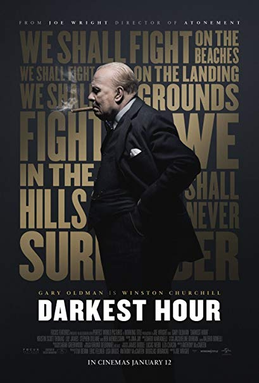Let's get this out of the way: Gary Oldman is winning the Best Actor Oscar for his performance in Darkest Hour. No contest. I went to see this movie because it was inevitable that he would be nominated, but I didn't think I would care for the rest of the film. However, in all the talk about Oldman, it had completely escaped my notice that Joe Wright directed this movie. Ever since his debut film, Pride & Prejudice, I have been a massive fan of Joe Wright's work (OK fine, like the rest of the world, I didn't watch Pan), and Darkest Hour features much of his trademark flair. Therefore, while I walked into the theater with some trepidation, I walked out very happy indeed.
This movie takes place in May 1940, when Neville Chamberlain is forced to step down as the Prime Minister of the UK and hands the reins over to Winston Churchill, the only man that the opposition Labour Party will accept. Churchill is not anyone's cup of tea; King George VI has reservations, while the Conservative Party are taking their cues from Chamberlain and Lord Halifax, who are still keen on their policies of appeasement and wary of Churchill's fierce rhetoric. As Churchill fills his War Cabinet with allies and enemies, the crisis in Dunkirk unfolds, and he must immediately begin to make painful decisions about how to lead his country and whether he is willing to sacrifice the lives of thousands of young soldiers.
It is a compelling period in WWII history, as evidenced by the fact that last year we already got a brilliant movie about it, Dunkirk. But while Christopher Nolan's focus was on the men fighting on the beaches, Joe Wright's focus is on the behind-the-scenes politics and military strategy of that historic event, concluding with Churchill's rousing "We shall fight on the beaches" speech in Parliament on June 4, 1940. I love Churchill and his deft command of the English language, and World War II always held my fascination ever since I first read about it in History class in eighth grade. Yes, as my friend Laura put it, all World War II movies feel the same, but they are not always told with such artistry and style, and there are elements of this movie that I found so compelling that I simply did not mind watching these events unfold on screen for the umpteenth time. However, one issue I had was that I already associated actors from The Crown, Dunkirk, and The King's Speech with some of these historical figures. It certainly took me a while to get accustomed to Oldman's interpretation of Churchill, when I've been so used to watching John Lithgow for the past two years.
The acting is top notch. Honestly, I did not recognize Gary Oldman for a single second in this movie. I kept trying to, but I simply could not. The kudos for that should really go to makeup wizard Kazuhiro Tsuji, but Oldman certainly nails the accent, cigar-smoking, champagne-swilling, booming and rapid speechifying Churchill-ness of it all. Kristin Scott Thomas is excellent as his wife, Clementine, a woman who has always let her husband put his political ambitions ahead of his family but serves as his closest confidante and ally. Lily James is wonderful as Elizabeth Layton, Churchill's private secretary, who typed up so many of those magnificent speeches and firmly believes that "no one puts words together" quite like him. They share one scene in particular where no words are exchanged and it brings a lump to your throat to realize what these two people have been together in such a short period of time. Ben Mendelsohn is also wonderful as King George VI, the monarch who gradually comes to realize Winston's worth and becomes an unexpected friend. Yes, you feel bad that he has to compete against Colin Firth's Oscar-winning work in The King's Speech, but he holds his own.
When Joe Wright makes a movie, he creates a whole world. The production design and costumes are always stellar, and he tends to compose and edit scenes using peculiar angles or intricate cuts that absolutely delight my soul. There are certain transitions in this movie, like when a bloody battle scene slowly melts into the image of a solitary dead soldier's face, where you understand the full scale of war, from the bombing of swathes of countryside to the loss of each individual life. There is a running theme of ticking clocks, and the counting down of each day to reveal what enormous pressure Churchill is under and how this war is spiraling out of control on an hourly basis. The tunnels connecting Downing Street to the War rooms are dank and gloomy, and every meeting of the War Cabinet is taking place in a dark haze of cigar smoke and dim electric lighting. Churchill's pink pajamas have a little CSW monogram, his wife's coiffure is perfect at all times, and Elizabeth Leyton's typewriter is constantly hammering away in the background, committing those famous words to the annals of history. The tracking shots of Parliament reminded me of how much fun it is to watch Prime Minister's Questions and the score by Wright's longtime collaborator, Dario Marianelli, is unsurprisingly magnificent and will immerse you in the time period. The only misstep is an awful sequence involving Churchill taking the Tube to Westminister. It is a glaringly contrived moment in a movie that otherwise feels vivid and true.
Darkest Hour is a wonderful movie and the hype around Oldman's performance is well-earned. But thankfully, that performance is not the only reason to watch. There's so much to love, whether you are a connoisseur of history, film, or politics. It's cinematic poetry, and while Churchill may have had a way with words, Joe Wright certainly has a way with movies.

No comments:
Post a Comment